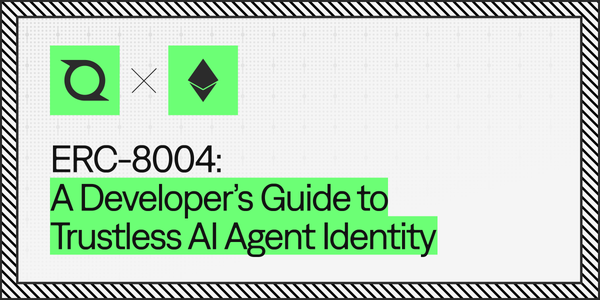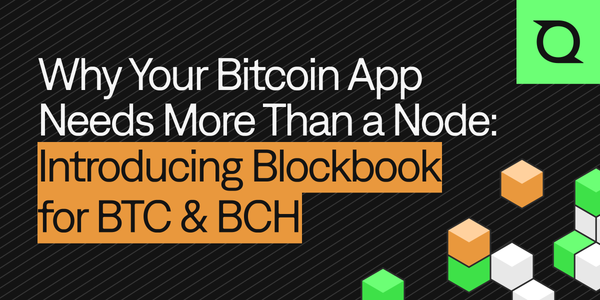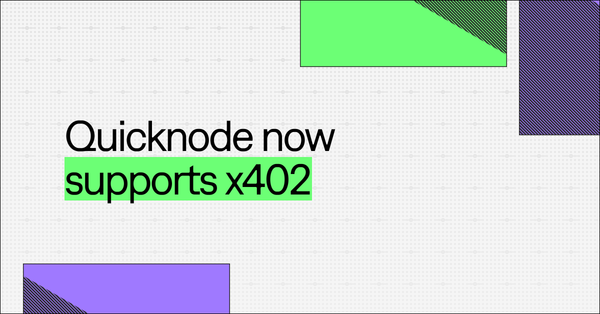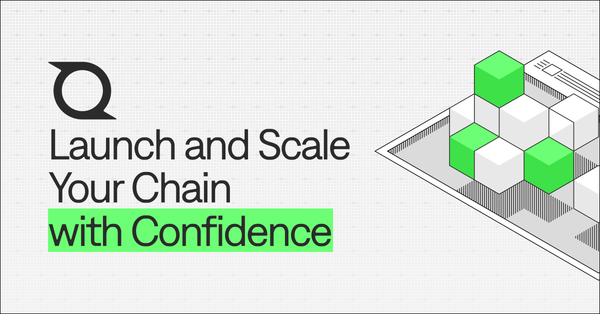Common Solana RPC Errors & Fixes Using QuickNode Logs
Learn how to identify and fix common Solana RPC errors using QuickNode Logs that provide real-time insights into every request and response.
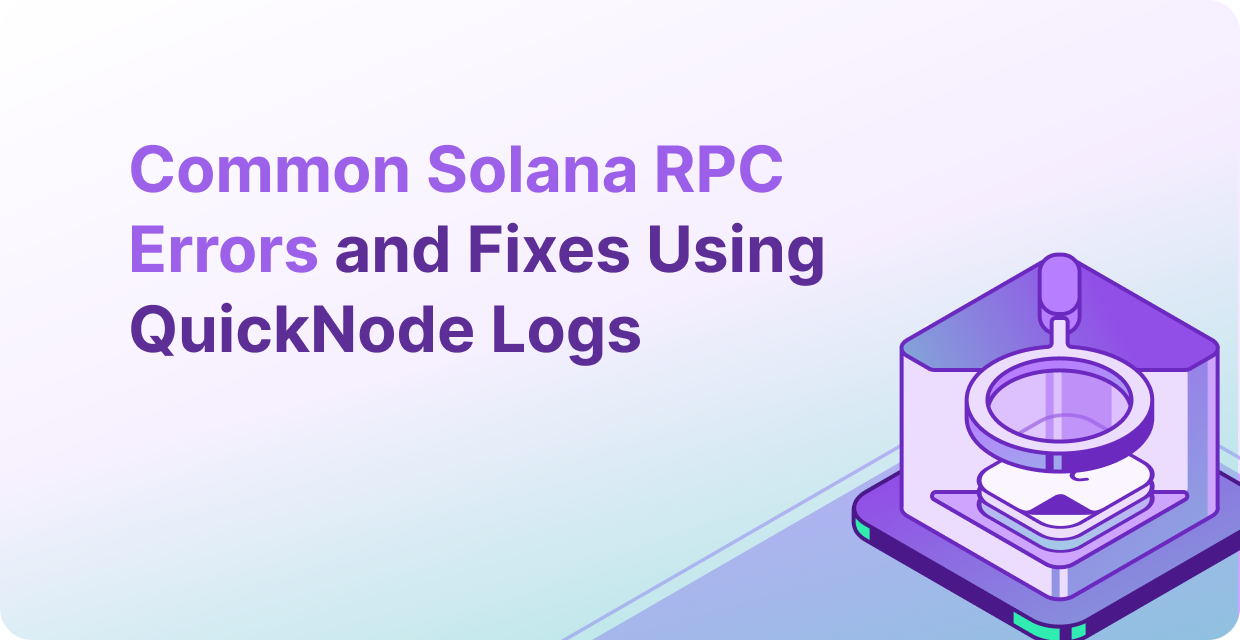
Remote Procedure Calls (RPCs) are the backbone of every Solana dApp, handling everything from transaction submissions to real-time account updates.
When RPC errors strike — whether from network congestion, rate limits, or misconfigured requests — they can halt entire development workflows and degrade user experiences in production.
With Solana’s high-speed, parallel architecture, even small missteps like stale blockhashes or rate-limited requests can quickly escalate into costly delays.
Traditional debugging lacks visibility, leaving developers guessing at root causes. QuickNode Logs transforms this process by providing deep insights into every RPC request and response, enabling developers to quickly detect, debug, and resolve errors with confidence rather than working blindly through cryptic error messages.
In this post, we’ll break down common Solana RPC errors and show how QuickNode Logs can help you detect, debug, and fix them with confidence.
Understanding Solana RPC Errors: The Foundation
Solana’s architecture was built for speed, boasting an industry-leading transaction per second (TPS), thanks to innovations like Proof of History (PoH) and Sealevel, its parallel transaction execution engine. Unlike Ethereum, which processes transactions sequentially, Solana executes them concurrently across multiple cores.
However, this design space creates entirely different error patterns than Ethereum or other blockchains. Here's why:
- Blockhash Expiration System: Unlike Ethereum's simple nonce system, Solana transactions must reference recent blockhashes that expire in 60-90 seconds. Perfectly valid transactions fail if the blockhash becomes stale—a timing issue, not a logic problem.
- Parallel Execution Conflicts: When multiple transactions modify the same accounts simultaneously, Solana's parallel processing creates race conditions and state conflicts that sequential blockchains never encounter.
- Compute Unit Resource Model: Transactions fail if they don't allocate enough compute units, regardless of fee payment. This resource-based failure is foreign to developers from gas-based networks.
Additionally, Solana’s optimistic concurrency and ultra-short block times mean that the state of the network can change between sending and confirming a transaction, especially during high load.
Traditional debugging methods — like manual retries or guess-and-check logs — simply don’t hold up in this environment. Errors can appear intermittently, with little context, and by the time you investigate, the state has already changed.
Up next: let’s break down the most common Solana RPC errors and what they really mean under the hood.
Common Solana RPC & HTTP Error Codes: Quick Reference
When debugging on Solana, it's essential to understand both HTTP-level errors (which signal client-side or server-side issues) and Solana-specific RPC errors (which signal issues with transactions, state, or protocol-level constraints).
Below is a breakdown of the most common errors and what they really mean.
HTTP Error Codes
| Code | Message | Explanation |
|---|---|---|
| 400 | Bad Request | Malformed HTTP request (e.g. using GET instead of POST, or invalid characters). |
| 401 | Unauthorized | Authentication failure — check token, IP whitelist, or JWT config. |
| 403 | Forbidden | Endpoint disabled (often due to billing issues). |
| 403 | Custom trace not allowed | Trace code not whitelisted. |
| 404 | Not Found | Incorrect URL or method. |
| 413 | Content Too Large | Request body exceeds the size limit. |
| 429 | Too Many Requests | Rate limit exceeded. |
| 500 | Internal Server Error | Server-side issue. |
| 503 | Service Unavailable | Node temporarily offline. |
Solana RPC Error Codes
| Code | Message | Explanation |
|---|---|---|
| -32001 | Block Cleaned Up | This is possibly an issue associated with a system upgrade. Please contact us for investigation. |
| -32002 | Transaction simulation failed | Commonly due to invalid instructions, parameters, or blockhash. |
| -32003 | Signature verification failure | Likely caused by incorrect or missing signatures. |
| -32004 | Block not available for slot | Transient error — retry mechanism recommended. |
| -32005 | Node is unhealthy | Node is lagging — switch or retry. |
| -32007 | Slot skipped or missing | The requested block does not exist. Verify using Solana Explorer. |
| -32009 | Slot missing in long-term storage | Historical block data is unavailable. |
| -32010 | Excluded from account indexes | Invalid payload or unsupported RPC method. |
| -32013 | Signature length mismatch | Incorrectly formatted signature. |
| -32014 | Block status unavailable | The block is not yet produced or synced — retry later. |
| -32015 | Transaction version not supported | Use "maxSupportedTransactionVersion": 0 in your request. |
| -32016 | Minimum context slot not reached | Requested slot context is ahead of the current state. |
| -32602 | Invalid params | Bad input values — double-check your request structure. |
@solana/errors package by Anza. It provides helpful references to decode and understand what’s going wrong under the hood.Next, let’s walk through how QuickNode Logs helps you fix these errors, fast.
Introducing QuickNode Logs for Real-Time Debugging
QuickNode Logs addresses this challenge by offering real-time visibility into all RPC activity made through QuickNode endpoints. Available directly within the QuickNode Dashboard, this feature allows developers to inspect the full lifecycle of requests and responses across supported networks, including Solana.
What QuickNode Logs Captures
Every RPC request and response flowing through QuickNode endpoints, including:
- Complete request payload: method calls, parameters, and headers
- Full response data: success responses, error codes, and detailed error messages
- Timing information: request duration and timestamp data
- Status codes: both HTTP-level and Solana-specific error codes
- Method-level filtering: isolate specific RPC calls like sendTransaction or getAccountInfo
QuickNode Logs offers powerful filtering options:
- Time-based: Last 15 minutes to 14 days (plan-dependent)
- Method-specific: Focus on problematic RPC calls
- Status code filtering: Show only errors or specific response codes
- Multi-chain support: Isolate issues by blockchain when using multi-chain endpoints
Privacy-First Design
Sensitive data is automatically filtered out of logs for select accounts, ensuring private keys and confidential information remain secure while still providing debugging visibility.
Dashboard Integration
Developers access logs directly from the QuickNode dashboard - no additional setup, external tools, or complex log parsing required. The debugging workflow stays in one centralized location.
By surfacing detailed transaction and request metadata, QuickNode Logs enables faster diagnosis, reduces downtime, and improves dApp performance.
Building Robust Solana Applications with QuickNode
Developing on Solana requires more than just speed, it also demands visibility, precision, and resilience.
QuickNode Logs transforms how developers approach Solana application development. Rather than reactive debugging after issues surface in production, developers gain proactive insights into application behavior, request patterns, and potential bottlenecks before they impact users.
Start using QuickNode Logs today to gain full insight into your Solana application and take the guesswork out of RPC troubleshooting.
Build with confidence; build with QuickNode.
Frequently Asked Questions (FAQs)
How do I access QuickNode Logs for my Solana endpoint?
QuickNode Logs are available directly in the QuickNode Dashboard under each endpoint. Logs are accessible based on plan tier, with longer retention and advanced filtering available on higher-tier plans.
Do QuickNode Logs store sensitive transaction or account data?
No. QuickNode implements privacy-first logging. Sensitive information such as private keys or wallet secrets is never stored or shown in logs for select accounts.
How quickly can I access logs after an RPC error occurs?
QuickNode Logs provides real-time visibility into RPC activity. Logs are available immediately after requests are processed, allowing developers to debug issues as they happen rather than waiting for batch processing or delayed log generation. This real-time access significantly reduces debugging cycles.
About QuickNode
QuickNode provides the tools and resources builders need to create incredible products. With a globally balanced infrastructure, guaranteed reliability, a user-friendly interface, and end-to-end customer support, QuickNode allows enterprises to realize their ideas on the chain rapidly.



